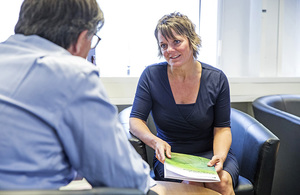- £134 million government investment to keep UK’s greenest, most innovative businesses thriving during coronavirus pandemic and could help to secure and create new jobs across the country
- projects to service offshore wind turbines autonomously, using AI to reduce beer waste in the brewing process and converting seaweed into compostable packaging to tackle plastic waste set to benefit
- investment part of the government’s commitment to build back better by supporting the UK’s risk takers to bring their novel ideas to market
Robots that patrol UK roads to detect and repair cracks and potholes, using Artificial Intelligence (AI) that will help to reduce beer waste and converting seaweed into compostable packaging are just some of over 1,000 projects that will today (Wednesday 4 November) receive £134 million of government investment.
Businesses right across the UK, from Glasgow to Devon, are set to benefit from the investment, enabling 1,069 ground-breaking clean growth projects develop new technologies, secure and create new jobs, drive productivity and tackle climate change.
This includes marine company Rovco in Bristol, which is developing unique technology allowing for autonomous underwater inspections of large offshore wind turbines. This will be crucial in assisting human operators carry out effective maintenance of one of the UK’s cleanest, renewable energy sources, which can often be dangerous, while ensuring it is carried out in accordance with social distancing measures.
KegTracker in Pontypridd, Wales, is aiming to reduce the amount of waste in the UK’s brewing industry by using artificial intelligence (AI) to turn kegs into ‘smart containers’ that will provide real time data to accurately monitor the condition and contents of kegs as they travel from brewery to pub and back again. This will help reduce the amount of liquid that is thrown away annually, currently costing the UK an estimated £5 billion a year.
Another company, Oceanium in Argyll, Scotland, is developing an advanced bio-refinery which will turn seaweed into food and compostable packaging products, tackling plastic waste and creating new jobs in the local area, while supporting the UK’s target to reach net zero carbon emissions by 2050.
These ideas could transform whole industries such as manufacturing, hospitality and the automotive sector by helping them respond to the unique challenges presented by the pandemic, while supporting risk takers to bring their novel ideas to market.
Business Secretary Alok Sharma said:
The UK’s response to coronavirus has demonstrated the very best of British ingenuity, and it is this resourcefulness that will help us navigate our way through this pandemic.
Today’s investment will ensure that our innovators and risk-takers can continue to scale up their ideas, helping the UK to build back better and ensure we meet our clear commitments on tackling climate change.
An additional company receiving funding today includes Robotiz3D in Manchester, which is developing autonomous technology which will enable robots to be deployed to patrol UK roads to detect and repair cracks and potholes as soon as they appear. This approach will speed up the time taken to make repairs and will lower overall costs, while reducing the carbon footprint caused by road maintenance vehicles.
The Sustainable Innovation Fund, delivered through Innovate UK, is a cornerstone of the £1.25 billion investment package announced by the Chancellor in April to help ambitious, innovative businesses survive and thrive during the current pandemic.
Executive Chair Innovate UK Dr Ian Campbell said:
Yet again we see the exciting range of business innovation taking place across the United Kingdom, despite these difficult times.
Every initiative we’ve supported here represents an important step forward in sustainable economic development, but also one step nearer dreams becoming reality for ambitious hard-working company owners and their staff.
The investment forms part of the government’s commitment to support the UK’s entrepreneurs and start-ups to scale up their innovations, set out in its ambitious R&D Roadmap in July this year.
- The £134 million funding comes from Innovate UK’s Sustainable innovation Fund, which was launched as part of the £550 million package of measures to support innovative SMEs respond to COVID-19
- each business will receive up to £175,000 from the £134 million funding
- for a smaller number of recipients, their award is the first phase of a 2-part competition under the Small Business Research Initiative (SBRI) that addresses specific net zero and clean growth challenges as part of the government’s pledge to tackle climate change



